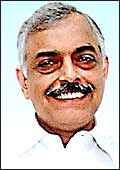 |
Polaris’ Arun Jain:
Profitable times |
In an
industry where 30 per cent net profit margins are pretty much the
norm-at least amongst the first tier of Indian it services firms-a
margin of 2.6 per cent at the net level is difficult to reconcile
with. That explains to a large extent why the stock of Polaris Software
Labs has been treated with disdain for the past three-four years,
during which the stock price hit an all-time low of Rs 51.8 in June
2006. But just when industry pundits and analysts were poised to
give up on Polaris, the company has begun showing signs of a revival.
After a miserable 2005-06, when the company posted revenues of Rs
825 crore and a profit after tax (pat) of Rs 21.3 crore-as against
a pat of Rs 58 crore in the previous year-the Chennai-headquartered
company has bounced back in the current fiscal with revenues for
the nine-month period ended December 2006 of Rs 761.59 crore and
net profits of Rs 79.6 crore. That's a net margin of 10.5 per cent-still
not up there with the best, but a huge improvement nevertheless.
By the close of the year, the company is confident of crossing Rs
1,000 crore in turnover and Rs 100 crore in net profit. The stock
markets have been quick to sense a turnaround, with the scrip galloping
a little over four-fold since last June.
Polaris' problem has always been profitability, right from when
the Citigroup company OrbiTech was merged into it in 2002-03.
Revenues got a huge leg-up no doubt (from Rs 293 crore to Rs 431
crore post-merger), but pat margins were confined to single digits.
Arun Jain, Chairman & CEO, Polaris, has an explanation for
the bottom line woes. "Our investments peaked in 2005-06.
Companies in the growth phase do have one bad year when they invest
for growth. I have always believed in the product and services
combination model for a mid-cap company like Polaris-it takes
time but that is the only way we can hold our own against the
biggies," he says.
The Polaris top brass feels that strategy is getting validated.
"At best there has been a delay of a couple of years when
we made mistakes, which have only made us wiser,'' says Ashok
Korwar, a long time management consultant and advisor to Polaris.
Prior to the acquisition of OrbiTech, Polaris was having difficulty
selling its banking expertise overseas; its credentials of having
developed robust products for Citibank were clearly inadequate.
Clients raised issues of intellectual property rights (IPR). The
Polaris management thought that by acquiring IPRs through OrbiTech
it could fix that problem.
But that wasn't the only issue clients had. Many of them did
not want the 'monolithic product platform' that Polaris offered-which
may be modern and even futuristic but entailed shutting down banking
operations during implementation. By 2003-04, Polaris had learnt
its lessons and changes were made in the product to make it flexible
enough to sit on any existing platform. This way banks could implement
modules they desired without any major hiccup in operations. But
the reorientation, the branding of the new product from Orbisuite
to Intellect and, finally the selling, took time.
"We had to make massive investments, of at least Rs 100
crore just for products post merger, but for 2005-06 we did not
capitalise product expenses. If we did not follow conservative
accounting practices, we would have shown a better bottom line,"
says Jain. Currently, the core team that works on product development
consists of 150-the remaining 650 have been shifted to product
implementation, maintenance and support onsite.
By 2005-06 Polaris, as one company official puts it, had a lot
of things to sell but not enough feet to do the selling. Enter
Arup Gupta from TCS as Chief Operating Officer. His immediate
priority was to streamline operations. Marketing, sales, delivery
were integrated. "We are doing top-end work with 11 of the
top 25 banks globally and 11 more are talking to us," says
Jain. Adds Gupta: "The average size of a deal has now grown
from $1 million (Rs 4.5 crore) to $5 million (Rs 22.5 crore) and
we will be taking this to $10 million (Rs 45 crore) in 12-18 months.''
A recent J.P. Morgan report says: "Polaris is our top pick
in the mid-cap India it space." However, as the gap between
the Tier-I and Tier-II of Indian it services keeps widening every
quarter, Polaris has to scale up fast-and profitably.
Cross-Border
Dosage
Merck Generics keeps Indian pharma-and
PE-interested.
 |
| Cipla’s Lulla:
Deal time |
For a business that's conser
vatively valued at $5 billion (Rs 22,500 crore), it's inviting its
share of suitors. Predictably, a host of names from the private
equity universe, including Carlyle, Blackstone, Apex, Texas Pacific
Group, KKR and Warburg Pincus (the last two are said to have joined
hands), are believed to have thrown their hats into the ring for
Merck's global generics business. That's in addition to the two
domestic pharma majors, Ranbaxy and Cipla, who are in the race.
At the time of writing, Dr Reddy's Labs, too, had reportedly joined
the fray. Iceland's Actavis is also keen on Merck Generics. The
PE firms may partner one of the Indian companies in a deal. It is
learnt that discussions between Carlyle and Blackstone with both
Cipla and Ranbaxy have made significant progress. Says Amar Lulla,
Joint Managing Director, Cipla: "A consortium of private equity
investors wants us to join them." Lulla declined to name the
investors. Ranbaxy's CEO and MD Malvinder Singh told BT that Merck's
generic business was a quality asset. "It offers a strategic
fit to our global business and we would certainly be interested
if it is available at the right price and enhances shareholder value."
Industry observers point out that the interest of private equity
players is the result of the size of the deal. "It may be difficult
for a company in India to make a deal of this size on its own,"
says a Mumbai-based investment banker.
-Krishna Gopalan
STAR's New Formation
The broadcaster's acting CEO has his task
cut out.
 |
| STAR’s Nair:
Ready for a new role |
With two of its India CEOs-Peter
Mukerjea and Sameer Nair-on their way out, star India's new acting
Chief, Paul Aiello, has his task cut out. Not only does he have
to ensure that Mukerjea and Nair don't play pied-piper, taking along
the cream of star TV's talent along with them, he's got to find
some magic to make KBC iii as popular as it was in its first avatar.
Even as rumours last fortnight suggested that 17 star India employees
will cling on to Nair's coat-tails, according to company insiders,
Aiello met up with the senior employees on a one-on-one basis. Aiello
is also understood to have sent out a mail to all employees across
the India office, assuring them of a smooth transition. He is understood
to have said in his mail that India is an important market with
huge opportunities.
One of those is mobile entertainment, where star is keen to
tap the current Rs 2,000 crore mobile value-added services sector.
The company last year set up a mobile and interactive division
'star Mobile Entertainment' to grow the business. By end-February,
it will launch a new platform called Plus, a solution for consumers
to catch up on television, sports, movies, shopping and banking
on the go. star expects 30 per cent of its revenue to accrue from
mobile entertainment in the near future, say company sources.
The bulk of income will, of course, still come from broadcasting,
with blockbuster programmes like KBC iii. However, not just are
ratings lower this time around when compared with KBC I, they've
initially shown a declining trend, in contrast to the first avatar,
when ratings soared in the first week of the show. Should star
be worried? Outgoing CEO Nair maintains that "we have conclusively
met all our objectives for KBC with Shah Rukh Khan." One
of those objectives was to wrestle back the 9-10 pm band. It appears
to have succeeded there, what with star Plus racking up 2.5 times
more viewership than competitor Zee in that slot. With or without
Nair, the fight-back has begun at star.
-Anusha Subramanian
Is Teledata a Bubble?
The company's big growth doesn't convince
The Street.
It's difficult to find
an equity analyst tracking his company, but that doesn't faze
K. Padmanabhan, whose dream for his group led by flagship Teledata
Informatics is to be as big as TCS some day soon. He's got some
way to go. For the first nine months of the year ending March
2007, Teledata had revenues of Rs 2,229 crore and profits of Rs
282.6 crore-TCS' corresponding numbers were Rs 11,034 crore and
Rs 2,678.5 crore, respectively. What's impressive though is Teledata's
growth rate during that period, against the previous year's corresponding
nine months: 273 per cent in revenues, and 159 per cent at the
net level. Over three years, its compounded annual growth is 200
per cent in profits and 112 per cent in sales.
Why then are brokerage houses not researching the stock-despite
which the price has shot up 424 per cent over five months (until
recently the stock was trading even below its earnings per share)?
Teledata Informatics is debt-free, and has 27 software solution
companies, which provide ERP and CRM solutions. It derives 95
per cent of its revenue from exports and, for good measure, is
also the fourth largest ship-owner in India with 14 ships, and
a global leader in providing ship management solutions. Says K.
Padmanabhan, Managing Director, Teledata Informatics: "We
haven't been able to generate confidence among investors. Therefore,
we are increasing our stake in the company." As on December
31, 2006, the promoters' holding in the company was 14.34 per
cent (till June it was below 5 per cent). Plans are to increase
it to 25 per cent.
In the first week of December, Teledata made a demerger announcement,
after which the stock with a Rs 10 face value took off-from under
par to around Rs 50 at the time of writing. For every 100 shares
of Teledata Informatics, shareholders will get 100 more shares
plus 50 shares each of Teledata Marine Solutions and Teledata
Technology Solutions. However, the face value of all the three
companies will come down to Rs 2 per share. That may not be the
most attractive demerger scheme in recent times. Says Amit Rathi,
Director, Anand Rathi Securities: "Worldwide entities with
multiple businesses suffer from conglomerate discount, as investors
like to give premium to standalone business. However, companies
with lower credentials demerge their businesses just to come in
spotlight." Padmanabhan, meantime, is aiming for $7.5 billion
(Rs 33,750 crore) in revenues by 2010. Should TCS watch out?
-Mahesh Nayak
|







